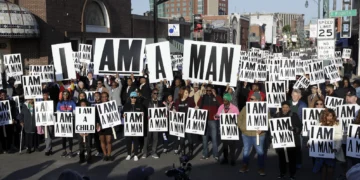Image Source: Pexel
July 13, 2024 Story by: Editor
Policy Matters Ohio recently published a report titled “Black Women Can Thrive in Ohio,” highlighting how existing systems disproportionately affect Black women due to the intersections of racism and gender inequality.
The report reveals that low pay, inadequate health care, and the criminal justice system “combine to reinforce poor health and economic outcomes for Black women.” Tanisha Pruitt, an education researcher for Policy Matters Ohio, emphasized, “It’s really just driving the point that Black women face multiple intersections. You’re Black, but you’re also a woman, and then you have to deal with all these other things within those intersections where we see the greatest disparities.”
The report states, “In Ohio and beyond, racially inequitable and so-called colorblind policies have not worked for — and have actively harmed — marginalized communities, largely linked by race and gender. When harmful policies intersect, as they do too often for Black women, the consequences can be devastating across generations.”
The report highlights the income disparities, with Black women in Ohio earning a median income of $44,131, significantly less than white men ($68,677), white women ($54,453), and Black men ($50,001). This pay gap is attributed to Black women often occupying low-wage jobs such as child care and service roles.
“Across races, women are paid less than their male counterparts The older women get, the greater the pay disparity between them and their male counterparts,” the report notes. “The pay disparity drives the poverty disparity, and directly drives child poverty, as Black women are more likely than their counterparts to be the sole or primary breadwinner for their families.”
Maternal mortality rates are also alarmingly high for Black women in Ohio, with 29.5 deaths per 100,000 births in 2022. Pruitt pointed out that Black women have less access to quality healthcare and often face biases within the healthcare system. “There’s a lot of biases within the healthcare profession where the healthcare individuals often don’t listen to (Black women) when they go to the doctor so a lot of stuff goes undiagnosed or unrecognized, until you’re in the thick of giving birth, and then all these complications arise. Unfortunately, a lot of women lose their lives because of it.”
The report also highlights that Black mothers are more likely to experience postpartum depression but are less likely to receive treatment.
Policy Matters Ohio provided several policy recommendations:
- Raising Ohio’s minimum wage. Although One Fair Wage did not make it onto Ohio’s ballot this year, there are plans to push for its inclusion in next year’s election. Policy Matters Ohio plans to make suggestions to Senate Bill 256, which proposes raising the minimum wage for non-tipped workers to $15 and tipped workers to $7.50 by 2028.
- Creating an Ohio Child Tax Credit and adding a 10% refundable option to Ohio’s Earned Income Tax Credit.
- Increasing pay for childcare providers and workers.
- Expanding access to the Supplemental Nutrition Assistance Program (SNAP).
Hiring more Black women. Source: Ohio Capital Journal

















